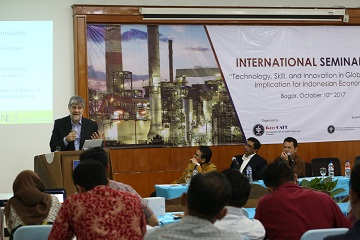Foreign Researchers Told Indonesian Worker’ Skill in 2017 IPB Intercafe Seminar

International Center for Applied Finance and Economic (INTERCAFE) of the Institute of Research and Community Empowerment of Bogor Agricultural University (LPPM IPB) (IPB) organized the International Seminar 2017, the theme "Technology, Skill and Innovation in Global Context Implication for Indonesian Economy", on Tuesday, 10 October 2017. The event was implemented in the Aula of PKSPL IPB, Campus IPB, Baranangsiang, Bogor. The event was jointly organized between Intercafe LPPM IPB, with the University of Adelaide, Directorate of Research and Innovation of IPB, and Flinders University.
Director of INTERCAFE of LPPM IPB, Dr. Nunung Nuryartono in his opening remarks stated that INTERCAFE with University of Adelaide and Flinders University as an active consortium, that carry out various activities related to human resource development through research and educational programs.
The seminar discussed the response and readiness of Indonesian human resources to enter and compete with the developed country of the world. Indonesia's readiness level in ASEAN region is under Singapore, Malaysia, Thailand and Philippine. Even in the level of technological readiness in information and communication technology, the position of Indonesia is under Vietnam.
Resource person for the seminar was Prof. Shandre Thangavelu, Associate Professor of University of Adelaide, who is Regional Director-Southeast Asia CIES; Kostas Mavromaras, the Director of National Institute of Labor Studies (NILS) of Flinders University; and keynote speaker was Dr. Muhammad Dimyati, of the Ministry of Research, Technology and Higher Education (Kemenristekdikti) RI.
Vice Rector for Research and Cooperation of IPB, Prof. Dr. Anas Miftah Fauzi, in his opening remarks stated that the theme is very relevant to the government's desire, something related to technology, innovation and skill. "It has been stated by the president that we need a more adaptive curriculum for technological change and the future. The organization of this special event enable us to compare Indonesia with Malaysia and Singapore. We need examples we cite to technology implementation, skills and innovation, "he said.
Related research, Prof. Anas stated that IPB in last ten consecutive years has made a lot of contribution for the development of Indonesia. In addition, IPB has established cooperation with various state-owned enterprises for the implementation of technology or innovations have been produced.
Meanwhile, Prof. Shandre Thangavelu said how ASEAN face the challenge of AFTA and the liberal economy. According to him, there is a large gap between skilled and unskilled labou r, thus increasing the income gap. It makes the middle workforce eliminated. He also suggested the management of human resources in the central government that it can be equal.
Kostas Mavromaras presented in his presentation on Indonesian workforce. More than a decade of macroeconomic growth has succeeded in pushing Indonesia's unemployment rate into a steady downward trend. Indonesia is a quintessential labour-surplus nation. At the end of 2006, an estimated 11 percent of Indonesian workers (11.6 million) were unemployed, and underemployment was over 20 percent (45 million workers). But, as around two million Indonesians enter the labour force each year, it will be a challenge for the Indonesian government to stimulate job creation so that the labour market can absorb this group of annual newcomers; youth unemployment (among the freshly graduated) in particular is a cause for concern and immediate action. According to him, the growth is a tremendous potential.
Kostas said that improving the skills of Indonesian workers is important. "Currently the focus is on 11.6 million and will continue to grow. The imbalance of skills problems in Indonesia should be identified using data which are handled by universities, "he said. (Wied)



